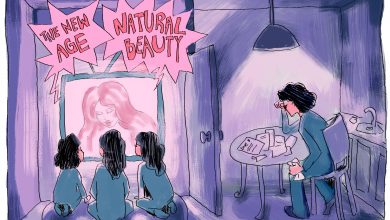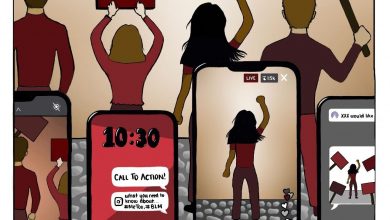Internet Issues

Photo by Andrea Demagistris via Flickr / CC BY SA-2.0.
As I was growing up — in the age of MySpace, LiveJournal, Yahoo IM Chats, and flip phones — my parent and teachers continually told me to be cautious about what I share on the internet. They said that anything I posted online would be there forever, and that it could be shared with anyone without my consent. They weren’t wrong — online harassment and stalking are very real issues. But boundaries and internet safety aside, it was a strange concept to introduce. I was told as a 13 year old that what I shared online in 2006 could impact my career prospects in 10, 20, 30 years.
Perhaps they were right to warn me. It’s so bizarre that the internet saves traces of past lives I hardly even remember. I still can’t figure out how to delete that Twitter I abandoned five years ago, or if my MySpace messages still exist somewhere. These former selves — the angsty teenager, the naïve college freshman — reappear as ghosts out of the technological void, threatening to ruin any facade of professionalism I can fake.
But in what ways does this pressure to remain untarnished and palatable limit self-expression? If we face extraordinarily high consequences for letting out emotions online, for having 2D proof of partying, for posting controversial art or political views, for exploring our bodies, sexualities, or identities on an open forum, what are we losing?
The nature of the data that can shatter that facade is what concerns me. Stigma emanates from displays of too much emotion, too much radicalism, too much exploration of issues surrounding one’s race, gender, or sexuality, and from too many images of one’s self. Even sharing taboo personal experiences or spreading bad art, poetry, or writing can leave a mark. All of this data is racialized and gendered. Even what is considered bad art, or what is seen as a post with an embarrassing amount of emotion, is intimately linked to understandings that what is respectable, acceptable, and professional is the norms of whiteness, cis-ness, manhood, middle-class standards, and neurotypicality. Airing political views that question the dominating centrality of this norm becomes too radical to be acceptable. What’s really stigmatized is identifying too heavily with being a woman and/or gender nonconforming, being a person of color, and with engaging in movements to end systemic oppression.
How does this function online? I have a theory. In my department at UCLA, we spend a lot of time using Michel Foucault‘s ideas (though I do have a lot of problems with him). One of his particularly well-known concepts is the that of the panopticon: originally a prison designed so that the inmates cannot see if the guards are watching, it is now part of Foucault’s theory that social control is exerted onto subjects when we learn to behave as if we are being watched. This process works to make subjects internalize society’s gaze and discipline our behaviour.
And isn’t that how the internet has been made for women, girls, and people of gender-nonconforming identities? We are continually pressured to edit ourselves for fear that a future employer, grad school admissions board member, or whoever else decides to investigate our online catalogue will happen across that digital data one day.
Some extent of this self-editing is understandable. Many of us want an inhabitable internet, where we will not usually be subject to postings of whatever we deem inappropriate. Some argue that this policing keeps things civil. I don’t want to cry out about loss of right to free speech — speech has consequences and that is frequently a good thing. But it is also our job as a society to debate when it isn’t a good thing.
The terrain of the internet matters. It is a tool that people can use to spread creative thought. To find community. To begin movements. To create connections and explore our interests. While it isn’t a utopia, there is still as much potential as we as a community want to create.
Through that tool I can see people pushing back against social restrictions. They’re speaking out about their experiences and sharing their creativity. Writers on Fem who courageously share their personal writing with a broad audience come to mind. I can also see people navigating the terrain as best they can, strategically hiding parts of themselves so that they can keep their job or get into that program. Some Fem writers have taken down their articles while they go through application processes. While it’s not an easy choice to take your name off of the material you worked hard to produce, it’s a move towards survival and success that I can respect.
We need to keep critically examining the functions of the internet’s memory. We need to keep asking the question: as the panopticon of surveillance surrounds us, where is the space for self expression and experimentation?




